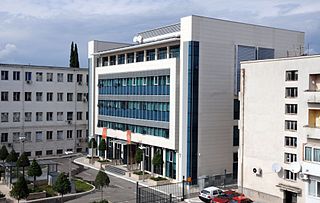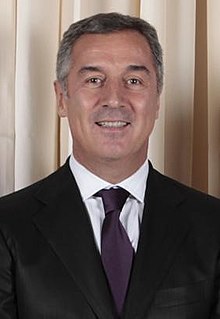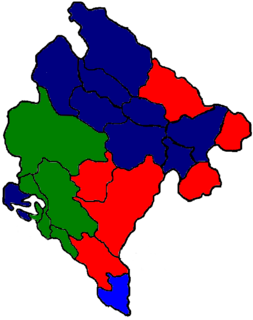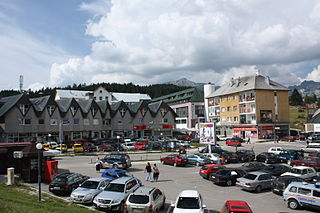
The Democratic Party of Socialists of Montenegro is the ruling political party in Montenegro. It has been so since the introduction of a multi-party system in 1990.

The Socialist People's Party of Montenegro is a socially conservative social-democratic opposition political party in Montenegro. It is part of the Key Coalition, an opposition political alliance in Montenegro. It has 2 of 3 MPs which it won in the 2016 parliamentary election. The party is pro-European Union and anti-NATO.

Liberal Alliance of Montenegro was a liberal separatist anti-war political party active in Montenegro between 1990 and 2005. Liberal Alliance was a full member of Liberal International from 1994 until its dissolution in 2005.
Coalition for a European Montenegro was the ruling political alliance in Montenegro headed by Milo Đukanović's Democratic Party of Socialists (DPS).

Parliamentary elections were held in Bulgaria on June 25, 2005, for the 240 members of the National Assembly. According to exit polls, the Socialists had a lead with around 31%, but without a majority, necessitating the creation of a coalition. The National Movement for Simeon II, in power before the election, was in second place, with around 21%. Following the election, Socialist Party leader Sergei Stanishev became Prime Minister.

General elections were held in Sweden on 19 September 1982. They saw the return of the Swedish Social Democratic Party to power after six years in opposition, the longest period in opposition by the Social Democrats since the 1910s. The center-right coalition of Thorbjörn Fälldin had earlier suffered a loss upon the breakup of the government in 1981, the year before the election, when the rightist Moderate Party chose to withdraw from the government, protesting against the centrist tax policies of the Fälldin government. After regaining power, socialist leader Olof Palme succeeded in being elected Prime Minister again, having earlier held power between 1969 and 1976.

An independence referendum was held in Montenegro on 21 May 2006. It was approved by 55.5% of voters, narrowly passing the 55% threshold. By 23 May, preliminary referendum results were recognized by all five permanent members of the United Nations Security Council, suggesting widespread international recognition if Montenegro were to become formally independent. On 31 May, the referendum commission officially confirmed the results of the referendum, verifying that 55.5% of the population of Montenegrin voters had voted in favor of independence. Because voters met the controversial threshold requirement of 55% approval set by the European Union, the referendum was incorporated into a declaration of independence during a special parliamentary session on 31 May. The Assembly of the Republic of Montenegro made a formal Declaration of Independence on Saturday 3 June.

The government of Montenegro is the executive branch of state authority in Montenegro. It is headed by the prime minister. It comprises the prime minister, the deputy prime ministers as well as ministers.

Constitutional Assembly elections were held in the newly independent Republic of Montenegro on 10 September 2006. Prime Minister Milo Đukanović's Coalition for a European Montenegro, at whose core was the Democratic Party of Socialists, won 39 seats in the 81 seat parliament with the vote near fully counted. The opposition blocs together received 34 seats. There were 484,430 eligible voters.
Parliamentary elections were held in Montenegro on 22 April 2001. The result was a victory for the Victory is of Montenegro alliance formed by the Democratic Party of Socialists of Montenegro and the Social Democratic Party of Montenegro, which won 36 of the 77 seats.
Parliamentary elections were held in Montenegro on 31 May 1998. The result was a victory for the So that we live better coalition formed by the Democratic Party of Socialists of Montenegro, Social Democratic Party of Montenegro and the People's Party of Montenegro which won 42 of the 78 seats.

The 2013 Old Royal Capital Cetinje municipal elections was held in Montenegro on Saturday, November 16, 2013 to elect representatives in the City Parliament of the Old Royal Capital Cetinje. All 33 seats were up for elections. In the previous mandate, Cetinje was governed by Democratic Party of Socialists (DPS), with mayor Aleksandar Bogdanović.
A political crisis in Montenegro was initiated by the opposition parties which staged protests requesting fair elections and transitional government. Opposition coalition Democratic Front organised continuous protests in October 2015 which culminated in a large riot in Podgorica on 24 October. A split in the ruling coalition followed in January 2016, leaving the government functioning as a de facto minority government.

Democratic Montenegro, also known as the Democrats, is a centrist political party in Montenegro. Its current leader, and the founder of Democratic Montenegro is Aleksa Bečić.

Presidential elections were held in Montenegro on 15 April 2018. Former Prime Minister Milo Đukanović of the ruling Democratic Party of Socialists (DPS) was elected as President of Montenegro in the first round.

Montenegrin municipal elections were held in all 21 municipalities, between June 2000 and October 2002.

Montenegrin municipal elections were held in all 21 municipalities, between June 2004 and October 2006. It resulted in the victory of the ruling DPS-SDP coalition in 15 out of 21 municipalities, where they secured a majority, alone or in a coalition with national minority parties.

Montenegrin municipal elections were held in all 23 municipalities, between March 2012 and May 2014.


















